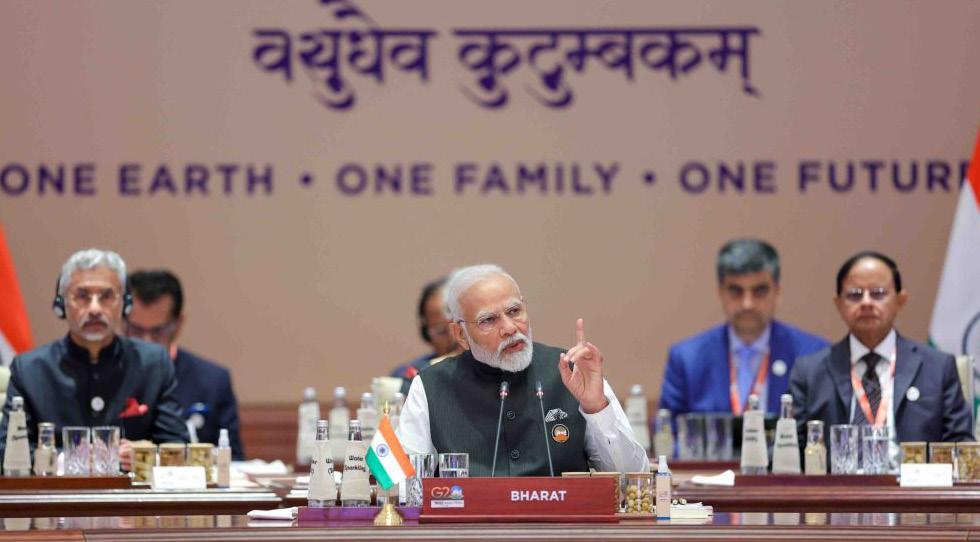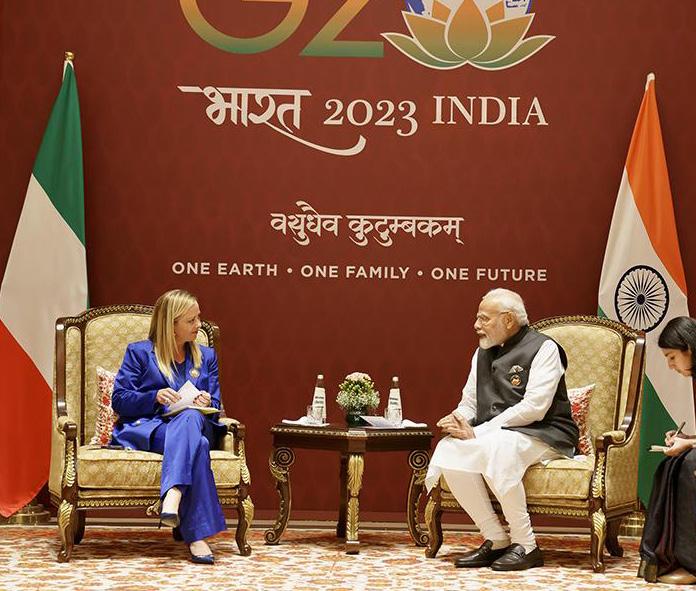
7 minute read
India’s G20 Presidency: A Triumph in Global Diplomacy
Amitabh Kant
In 2023, under the leadership of Prime Minister Narendra Modi, India hosted the G20 Summit, marking a pivotal moment in the diplomatic history of our nation – while also laying the groundwork for a transformative period in international dynamics. As India’s G20 Sherpa, I witnessed firsthand how this presidency became a defining force in reshaping the ways in which we perceive and prioritise our global developmental goals. The G20 Summit in India – which was second in a quartet of presidencies held by emerging economies – signalled the emergence of a multipolar world that was fast moving away from traditional Western-centric modalities of thought and governance. Championed by nations like India – which is both the largest democracy and a key player in the global economy – this transition culminated in the passing of the New Delhi Leader’s Declaration on September 9, 2023.
The New Delhi G20 Leaders’ Summit brought together leaders from the world’s major economies—accounting for 85% of global GDP and 75% of world trade. It showcased India’s commitment to emerging as a global champion of strategic dialogue and innovation. The theme “One Earth, One Family, One Future,” rooted in India’s cultural ethos of “Vasudhaiva Kutumbakam,” emphasised inclusivity and sustainable growth, setting the stage for an ambitious agenda that placed the interests of the Global South at the forefront.
A Catalyst for Global Change
The G20, as one of the most influential economic forums, proved critical in an era marked by economic uncertainties, especially with the ongoing impacts of the COVID-19 pandemic and geopolitical tensions. By expanding the forum to include the African Union as a permanent member, India’s presidency amplified the voices of diverse nations, making good on our commitment to inclusive representation and governance that reflects contemporary realities of the day. It was a profound statement of intent towards equitable growth and collaboration.
The backdrop to our G20 Presidency was a shifting global landscape, where emerging economies increasingly shape the economic order. Recent forecasts by global financial institutions like the World Bank and IMF highlight that the Global South will drive three-fourths of global growth in the upcoming decades. With Asia at the forefront, India’s role as a market leader, producer, and peacekeeper becomes key. Historically, the Global South has faced governance challenges, but today these nations act as bridges between development and sustainability, learning from past crises and cultivating innovative economic approaches for the future.
The United Nations, once the bedrock of multilateral diplomacy, now finds itself confronted with challenges that have hindered its effectiveness and relevance. The sheer size and complexity of the UN system often leads to inefficiency, and its decision-making processes are hampered by outdated mechanisms. The structure of the United Nations Security Council exacerbates this stagnation. The presence of veto powers held by a select few nations has frequently resulted in paralysis, preventing timely action on pressing global issues that affect the rest of the world.
In this context, the G20 emerges as a critical platform for global cooperation. India recognized this role, while also understanding that it would inevitably be caught in the complexities of the RussiaUkraine issue, where achieving consensus would be challenging. However, as a country of considerable influence, India knew that it was essential to re-focus the
G20 on its original mandate. By emphasising collaboration and consensus-building on pressing global challenges, India aimed to reinvigorate the dialogue within the G20, steering the agenda towards themes such as economic resilience, climate action, and sustainable development that resonate deeply with all member states, especially those from the Global South. This strategic redirection sought to mitigate divisions, while also creating a spirit of unity and shared purpose among nations – so that the G20 remains as an effective and agile forum for international governance.
Pioneering Initiatives and Sustainable Solutions
The New Delhi Leaders’ Declaration is a document that embodies India’s commitment to inclusivity, sustainability, and shared responsibility. The 83-paragraph Declaration, noted for its clarity and consensus, champions collective action on major global issues such as climate change, digital transformation, and social inequalities.
Central to this was the Green Development Pact (GDP), a key initiative that reflects a heightened global sensitivity to the intersection between environmental protection and development.
The Green Development Pact outlines ambitious climate goals by redefining how nations approach sustainability collectively. The GDP was built on several crucial pillars, including a commitment to curbing greenhouse gas emissions, enhancing renewable energy capacity, and promoting sustainable lifestyles. Recognising that climate change is a ubiquitous threat requiring coordinated action, the GDP sets clear targets: specifically, G20 members agreed to rapidly scale up their renewable energy capacities to triple global production by 2030. This commitment is expected to avoid billions of tonnes of carbon emissions. individual actions with global climate strategies, emphasizing that sustainability is not just a governmental responsibility but a shared duty among individuals and communities.
On climate financing, G20 leaders finally acknowledged the urgent need to increase climate finance from billions to trillions of dollars, highlighting that the developed world must fulfil its financial commitments to support developing nations in pursuing sustainable development goals, and that much more was needed than had been promised.
This addressed the stark reality that developing countries, often the most affected by climate change, require substantial investments to adapt and mitigate the impacts of global warming. To this end, discussions centred around establishing a New Collective Quantified Goal (NCQG) for climate financing aimed at enhancing predictability and accountability in financial commitments, ensuring that financial flows match the needs of vulnerable nations.
In addition, the GDP emphasised the significance of integrating financial institutions into climate action, championing the establishment and reform of Multilateral Development Banks. The leaders recognised that these entities must be better, bigger, more effective and representative to mobilise the necessary resources for climate initiatives, ensuring that investments reach the grassroots level where they are critically needed.
Recognising that climate change is a ubiquitous threat requiring coordinated action, the GDP sets clear targets: specifically, G20 members agreed to rapidly scale up their renewable energy capacities to triple global production by 2030.
Technological Transformation and Digital Public Infrastructure
The ambitious G20 2023 Action Plan on Accelerating Progress on the SDGs adopted by all G20 member countries strategically focuses on transformative areas such as digital transformation, gender equality, and sustainable transitions to accelerate the realisation of SDGs worldwide.
India also pushed for the mainstreaming of the concept of “LiFE” or Lifestyle for the Sustainable Development, which encourages sustainable consumption and production patterns that reduce carbon footprints. This initiative seeks to align
Further, India’s presidency spearheaded significant discussions on “Data for Development” (D4D) and Digital Public Infrastructure (DPI), recognising their role in fostering equitable growth. By defining DPI for the first time at a global level, India will be able to share its valuable experiences and best practices in building resilient, inclusive digital ecosystems. This pioneering approach sets a framework for developing countries to enhance their own digital infrastructures, tailored to their unique socio-economic contexts and needs.
India’s proposal for a global coalitionto support the deployment and scaling of DPI in low- and middle-income countries will activate this shared development. This coalition seeks to provide technical support, knowledge exchange, and co-investment opportunities to help nations build robust digital frameworks that can support various sectors, from healthcare to education and beyond. →

Voice of the Global South
The Summit also gave voice to historically underrepresented perspectives through the “Voice of the Global South Summit,” reaching out to 125 nations. This unprecedented gathering emphasized ‘Unity of Voice, Unity of Purpose,’ illustrating India’s commitment to inclusive dialogue and collective decision-making.
Even within the G20, India actively worked to amplify the voices of African nations, extending invitations to countries like Mauritius, Egypt, and Nigeria to participate in the forum’s dialogues. This effort resulted in unprecedented representation from African nations in G20 meetings, enabling a better understanding of their specific challenges and integrating their viewpoints into global discussions.
Cultural Diplomacy and Public Engagement
The most profound impact of our presidency extended beyond economic and environmental paradigms; it was in how we engaged the global community culturally and socially. India’s G20 was a
‘People’s Presidency,’ featuring 220 meetings across 60 cities, ensuring every corner of our diverse homeland rejoiced in the global communique. This vibrant engagement showcased our cultural heritage to the world, and underscored the democratic essence of our presidency.
From millet-based cuisines shared with delegates to over 7,000 artists participating in cultural showcases, the G20 in India was about fostering cross-cultural understanding. Initiatives such as the G20 University Connect series, Model G20 sessions in schools, and marathons had widespread public engagement, touching over 7 crore people through “Jan Bhagidari” efforts. This collective involvement not only resonated with our theme of “One Earth, One Family, One Future” but also rooted high-level discussions in the lives of everyday citizens.
The G20 Engagement Groups, including Business 20, Youth20, Science20, Labour20 and the Startup20 initiated by India, played a crucial role in integrating diverse perspectives into decision-making. They ensured the G20 agenda reflected the aspirations of various sectors, with Business 20 offering essential insights and innovative solutions from the private sector. Together, these groups enriched discussions and ensured that civil society’s expertise effectively shaped the agenda.
Women Empowerment and Global Health Initiatives
A standout feature of our presidency was the institutionalisation of gender equality in global discussions. The formation of a dedicated Women’s Working Group represented a significant stride towards integrating women’s voices across all policy dialogues, aiming to dismantle systemic barriers to their participation in economic, social, and political realms. This exemplified the paradigm shift that India brought about towards women-led development underlining it as a cornerstone for sustainable growth.
India also used its presidency to pioneer global health initiatives, endorsing the Global Initiative on Digital Health for Universal Health Coverage. Recognising the role of technological innovation in improving health outcomes, we positioned India as a leader in global health advocacy, stressing the importance of traditional medicine as evidenced byestablishing WHO’s Centre in Jamnagar.
Navigating Geopolitical Complexities
India’s G20 presidency successfully navigated intricate geopolitical challenges, including the Russia-Ukraine conflict, prioritizing peace and dialogue. By advocating that “Today’s era must not be |of war,” India fostered consensus on critical global issues yielding significant initiatives like the Millet Research Initiative for food security and advancing affordable digital services.
As India aims for a $35 trillion economy by 2040, it emphasizes sustainable innovation, tech leadership, and environmental responsibility. India has crafted a legacy of inclusivity and cooperation, positioning itself as a cornerstone of a more equitable and sustainable global order, inspiring future multilateral engagements as it handed over the presidency to Brazil. ■
The author is India’s G20 Sherpa and a former CEO of NITI Aayog. Views expressed are personal.
Today’s leaders and organizations are grappling with greater divisions and contradictions that present barriers to change and lasting impact. By bringing diverse stakeholders and ideas together, inspiring confidence, and working beyond traditional boundaries, APCO builds the un/common ground upon which progress is made.
What are you grappling with? Contact us and see how we can help your team at: apcoworldwide.com










